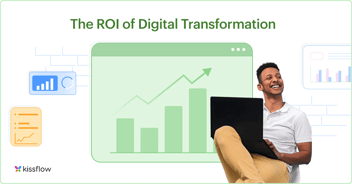Digital transformation is no longer a single project with a fixed endpoint. It has evolved into a continuous journey shaped by fast-paced technological advancements, shifting market demands, and stricter regulatory landscapes. Enterprises can’t afford to treat digital transformation trends as an isolated initiative. They must view it as an adaptive strategy that grows with their business. Over the years, technologies like cloud computing, automation, and low-code platforms have laid the groundwork. The focus is shifting toward AI-driven operations, collaborative innovation, and smarter infrastructure models.
This evolution is reaching a new inflection point in 2025. Organizations face growing pressure to harness AI, enable decentralized IT models through citizen development, and prioritize speed without compromising governance. These changes are not optional; they are foundational to future readiness. This blog explores the key digital transformation trends shaping 2025 and how forward-thinking enterprises can respond with agility. We’ll also examine how Kissflow enables IT leaders and process owners to adapt faster and deliver measurable business outcomes with fewer roadblocks.
The evolution of digital transformation: a quick look back
The digital transformation didn’t begin with AI or automation. Its roots go back to the cloud revolution, which redefined how businesses manage infrastructure. Moving away from on-premise systems gave organizations flexibility, scalability, and cost efficiency. It allowed IT teams to shift from maintenance-heavy models to more strategic roles, focusing on innovation rather than upkeep.
As cloud adoption became standard, automation took center stage. AI and robotic process automation (RPA) helped organizations move beyond manual workflows, improving speed and accuracy across finance, HR, and customer support functions. These tools accelerated internal processes, enabling businesses to respond faster and reduce operational waste.
The next significant shift came with the rise of low-code and no-code platforms. These technologies broke down barriers between business and IT. Instead of waiting in long queues for custom applications, process owners and department leaders could now design their own workflows and apps. This democratization of development reduced IT backlogs and encouraged faster innovation without compromising control or compliance.
Cloud, AI, and low-code foundational shifts have collectively paved the way for the next phase. In 2025, digital transformation trends will focus less on foundational adoption and more on scaling intelligently, enabling distributed innovation, and using data to make faster, more accurate decisions.
Key digital transformation trends to watch in 2025
2025 marks a shift from digital adoption to digital acceleration. These five trends will influence how organizations design systems, make decisions, and deliver value.
AI-powered automation and hyper-automation
AI is moving beyond task automation. In 2025, businesses will use AI to power systems that adapt and improve in real-time. Hyperautomation, which combines AI, machine learning, and process automation, will reduce manual intervention and drive faster decisions.
Example: Customer service tools will analyze sentiment and adjust responses on the fly, improving satisfaction and resolution time.
Low-code and no-code platforms are becoming the norm
Low-code and no-code tools are no longer optional. Enterprises facing growing IT backlogs will use these platforms to build and deploy internal apps faster. Business teams can take the lead on simple solutions while IT maintains oversight and governance.
Example: A compliance team builds a custom tracking workflow using Kissflow, reducing development time and freeing up IT to focus on core systems.
Cloud-native transformation and edge computing
Enterprises will adopt hybrid and multi-cloud strategies to improve resilience and scalability. Edge computing will gain ground for use cases that require low-latency, real-time processing.
Example: A healthcare provider uses edge AI to instantly monitor patient vitals and trigger alerts, improving response times without relying on cloud infrastructure.
AI-driven decision intelligence
AI will move into decision-making roles. Instead of just generating reports, AI tools will offer predictive and prescriptive guidance. This shift helps organizations act faster and more accurately.
Example: A bank uses AI models to score credit risk and recommend loan adjustments, cutting processing time and reducing exposure to bad debt.
Heightened focus on cybersecurity and compliance
With more digital services comes greater risk. Enterprises will need smarter tools to manage security and meet evolving compliance requirements. AI-based monitoring will become a standard part of IT strategy.
Example: Businesses will use anomaly detection tools to monitor user behavior and identify suspicious activity before it becomes a threat.
How businesses can prepare for these trends
Keeping pace with digital transformation trends in 2025 requires more than adopting new tools. IT leaders must focus on long-term outcomes and prepare their organizations to adapt quickly. Here are four strategic actions to take now.
Invest in AI and automation
AI is no longer an emerging trend but a core enabler of business performance. Use AI to automate workflows, personalize experiences, uncover insights, and drive faster decisions. Prioritize use cases where AI can reduce repetitive work and enhance department response time.
Action: Identify manual workflows that can benefit from intelligent automation. Start with areas like customer service, finance operations, or internal service requests.
Embrace low-code and no-code development
Low-code and no-code platforms help bridge the gap between business and IT. By enabling process owners to build their apps and workflows, IT teams can reduce backlog and shift focus to higher-value initiatives. These platforms also encourage innovation at the departmental level without compromising governance.
Action: Choose a platform that supports citizen development with strong IT oversight. Provide training and guidelines to process owners to build safely and effectively.
Strengthen cloud and data strategies
Hybrid and multi-cloud environments offer flexibility, cost efficiency, and business continuity. Pair this with edge computing for scenarios where latency matters. A strong cloud-native foundation ensures faster deployment, better scalability, and improved disaster recovery.
Action: Audit your current cloud infrastructure. Define a roadmap that includes cloud-native services, edge deployment for critical use cases, and real-time data integration.
Prioritize cybersecurity and compliance
As digital adoption grows, so do security risks. Compliance is no longer a one-time checkbox; it is an ongoing requirement. Adopt AI-driven tools to monitor activity, detect anomalies, and respond quickly to threats. Security should be integrated into every layer of your IT systems.
Action: Implement continuous monitoring tools. Review data access controls and update compliance protocols based on current regulations.
How Kissflow powers digital transformation in 2025
As digital transformation platform accelerates in 2025, enterprises need tools that support speed, flexibility, and control. Kissflow delivers on all three. It helps CIOs, IT leaders, and process owners work together to solve internal challenges and drive real business outcomes.
With Kissflow, organizations can:
- Build with low-code and no-code: Quickly design and deploy applications and workflows without heavy IT involvement
- Automate with intelligence: Use AI to drive adaptive processes that improve efficiency and accuracy
- Scale with cloud-native infrastructure: Integrate smoothly with existing systems and support hybrid deployments
- Stay compliant and secure: Rely on enterprise-grade governance, access control, and audit-ready systems
Kissflow supports IT teams managing application backlogs and business leaders looking to innovate from within. It creates a consistent flow between development and execution, making digital transformation more achievable at every level of the organization.
The future of digital transformation lies in simplicity, adaptability, and shared ownership. Kissflow gives you the platform to move forward faster and with confidence.



